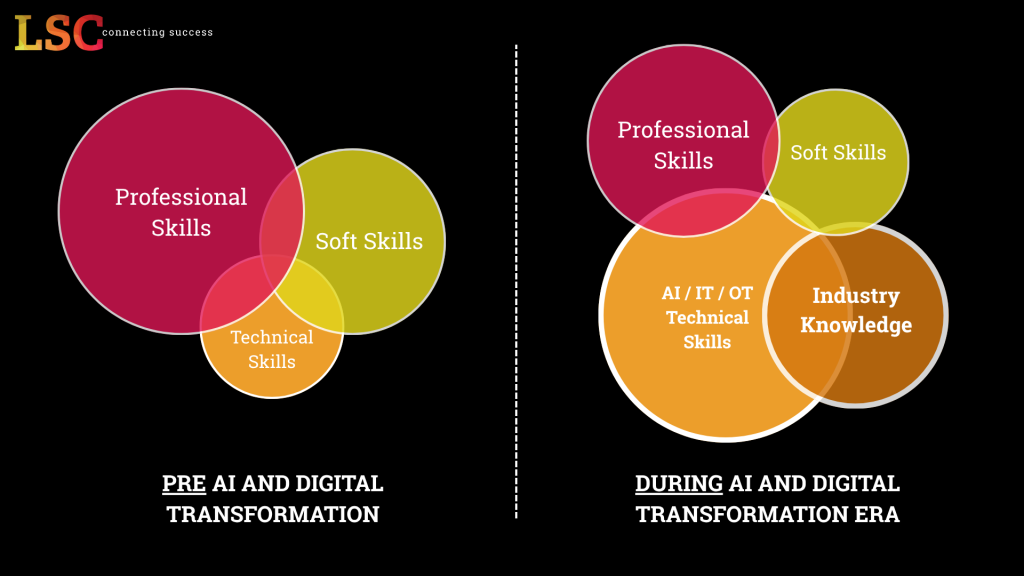Over the last five or six years at LSC, we’ve seen a massive shift in how we work. The IT infrastructure has exploded, the number of applications we use daily has multiplied, and behind the scenes, we’ve implemented over 400 automations. We now have five AI systems running to support our day-to-day operations.
So yes, a small indigenous Irish based SME is moving rapidly through Industry 4.0 and building a strategy for Industry 5.0 and as we are embracing AI, we’re discovering that there are different skill sets that are required. Skills we thought would be critical two years ago have evolved, and new ones are emerging that are reshaping how we work and what we value in our teams.
The skills we thought we need… and what we actually need now
If you’d asked us 24 months ago what skills would be critical, we’d have given you a very different list. But things have evolved. AI is now driving a shift in how people work—especially in how they make decisions.
People are moving faster from “I have a problem” to “AI has given me options.” That middle phase where you’d go off, gather data, try to understand it, that’s now much more streamlined. So what’s needed now is:
- Decision making
- Critical thinking
- Problem solving
These are the three big ones. AI takes care of the data gathering and information crunching. Now it’s about understanding the problem and making the right call.
Communication is still key, but it’s changing
Communication used to be right at the top of our list of key skills and while it is still important, what’s fascinating is how AI is helping people improve or augment their communication skills.
People who might have struggled with writing emails or putting together presentations are now using tools like Copilot or ChatGpt to:
- Draft responses
- Build decks
- Script their delivery
So while communication is still a critical skill, AI is helping people improve their fluency and get better at it. It’s augmenting their ability to express themselves clearly and professionally.
Relationship building is key
One thing AI can’t do? Build relationships.
That human connection, grabbing a coffee, understanding someone’s needs, building trust, that’s becoming one of the most important skills in this new world.
Why? AI is only as good as the information in the system. So much of the needs in a project are still held in peoples heads and the only way to get the “complete” picture is to have that chat to gather it. It doesn’t matter what industry you’re in or what role you have, relationship building is now front and center.
As with every technology there is also a down side. While AI is helping us to become more connected and communicate across multiple systems the Cyber thieves are also using AI to hack your data and systems. Cyber awareness and processes have become a basic requirement. It’s a hygiene factor! Everyone needs to be ultra-aware of cybersecurity risks as the digital ecosystems become ever more fully integrated.
What the data is telling us
When we looked for data on whats happening in the market we found a report from the ESRI that tracked the skills posted online for automation and AI roles in 2023. You would expect that the top skills would be technical skills is Python, Coding, Systems Architecture etc., but the top 14 skills weren’t technical.
They were things like:
- Working with teams
- Communication
- Leading others
- Problem solving
- Managing time
Computer programming didn’t show up until number 15.
So, even in roles that are specifically about automation and AI, employers are looking for soft skills or “power skills,” as there are called now.
What this means for you and the Industry
When implementing new IT systems/technologies the usual approach was to hire IT professionals who could support the implementation of systems and processes in a GMP environment. The current trend we are seeing from our clients is to look for professionals with a process/sciences background who have migrated to IT.
For example, clients are increasingly looking for:
- Process engineers
- Quality professionals
- Scientists
…who’ve shown an interest in IT and are ready to lead digital transformation initiatives.
Why? Because the AI tools often come pre-built and the real challenge is implementing them in a real-world pharma setting. That’s where domain knowledge meets tech fluency.
If you’re thinking about your next step…
If you’re an engineer, scientist, or manufacturing professional and you’re thinking about your next move, this is a huge opportunity.
Consider:
- A diploma or master’s in data analytics, AI, or digital transformation
- Upskilling in IT/OT integration
- Exploring how your domain expertise can drive innovation
The BioPharma industry is moving from Industry 3.0 to 4.0 (automation), and onto 5.0 (where human connection and empathy meet cutting-edge technology). The future belongs to those who can bridge both worlds.
Conclusion: New skills matrix

It’s a mix of soft skills like communication, collaboration, and relationship building, as well as the technical stuff like automation, data, and systems. It’s industry knowledge and understanding how things work on the ground in pharma manufacturing and it’s AI, IT, and OT fluency, being able to navigate and apply the tools that are driving transformation.
This blend is what’s shaping the future of work in our industry, and for those ready to lean in, there’s a real opportunity to lead the way.
